Ethical Dilemmas of Open Access
VerifiedAdded on 2020/05/28
|8
|2053
|150
AI Summary
This assignment delves into the ethical complexities surrounding open access scientific publishing. It analyzes a real-world case study of researcher Alexandra Elbakyan, who made millions of scientific journals freely available online. The paper examines this situation through the lens of four classical ethical theories: Utilitarianism, Deontology, Virtue Ethics, and Contract Theory. By applying these frameworks, the assignment aims to shed light on the moral dilemmas posed by Elbakyan's actions.
Contribute Materials
Your contribution can guide someone’s learning journey. Share your
documents today.
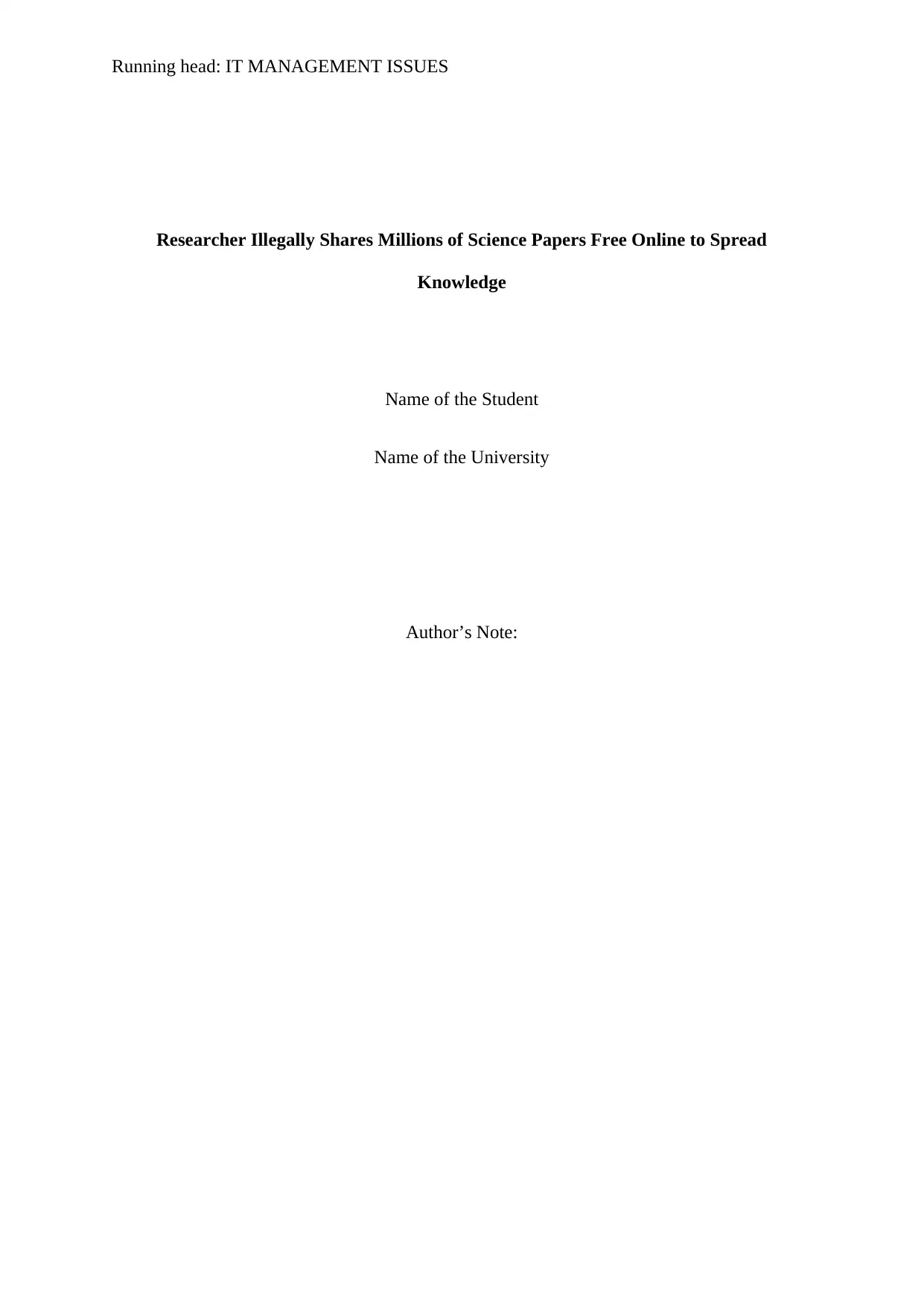
Running head: IT MANAGEMENT ISSUES
Researcher Illegally Shares Millions of Science Papers Free Online to Spread
Knowledge
Name of the Student
Name of the University
Author’s Note:
Researcher Illegally Shares Millions of Science Papers Free Online to Spread
Knowledge
Name of the Student
Name of the University
Author’s Note:
Secure Best Marks with AI Grader
Need help grading? Try our AI Grader for instant feedback on your assignments.
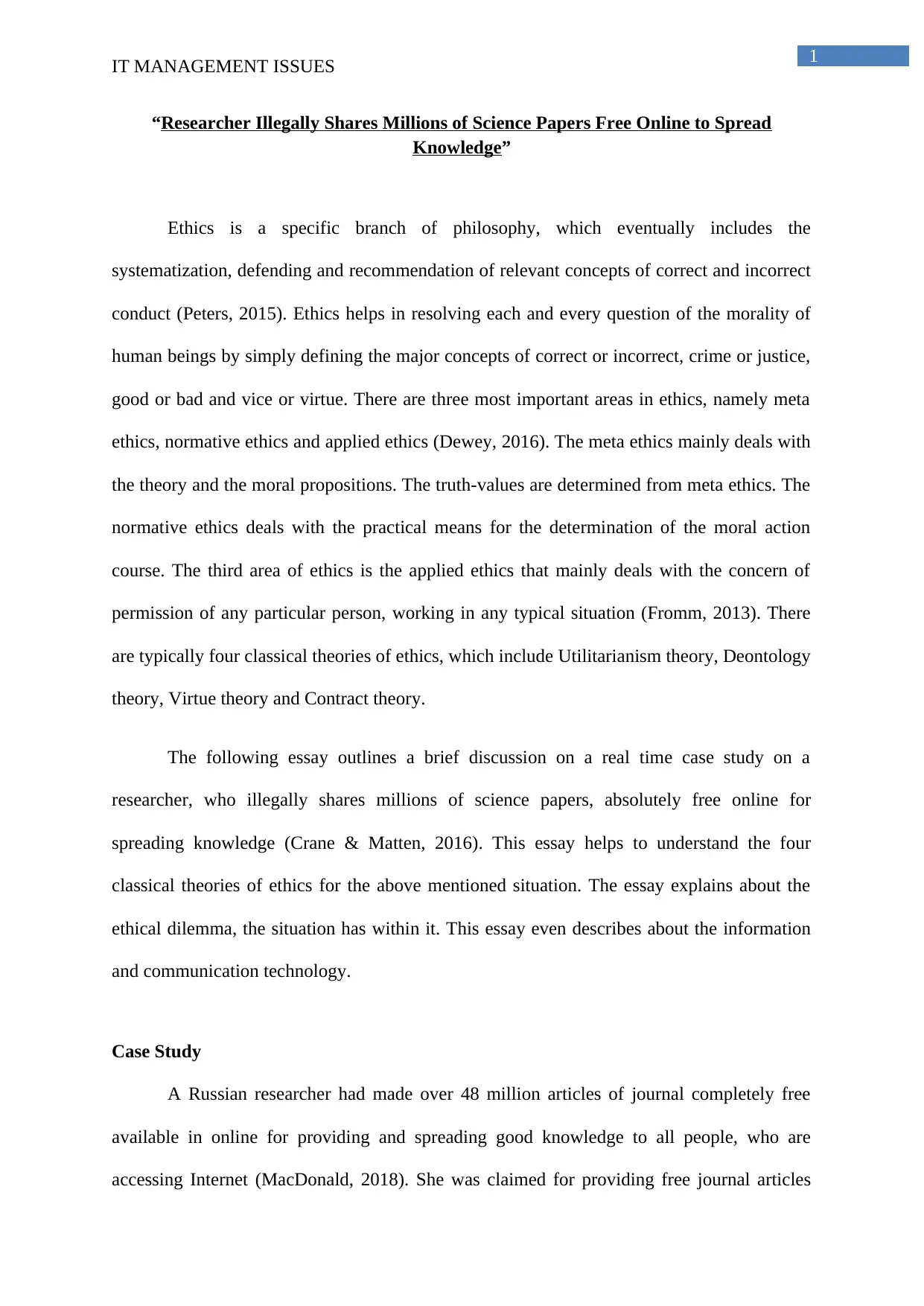
1
IT MANAGEMENT ISSUES
“Researcher Illegally Shares Millions of Science Papers Free Online to Spread
Knowledge”
Ethics is a specific branch of philosophy, which eventually includes the
systematization, defending and recommendation of relevant concepts of correct and incorrect
conduct (Peters, 2015). Ethics helps in resolving each and every question of the morality of
human beings by simply defining the major concepts of correct or incorrect, crime or justice,
good or bad and vice or virtue. There are three most important areas in ethics, namely meta
ethics, normative ethics and applied ethics (Dewey, 2016). The meta ethics mainly deals with
the theory and the moral propositions. The truth-values are determined from meta ethics. The
normative ethics deals with the practical means for the determination of the moral action
course. The third area of ethics is the applied ethics that mainly deals with the concern of
permission of any particular person, working in any typical situation (Fromm, 2013). There
are typically four classical theories of ethics, which include Utilitarianism theory, Deontology
theory, Virtue theory and Contract theory.
The following essay outlines a brief discussion on a real time case study on a
researcher, who illegally shares millions of science papers, absolutely free online for
spreading knowledge (Crane & Matten, 2016). This essay helps to understand the four
classical theories of ethics for the above mentioned situation. The essay explains about the
ethical dilemma, the situation has within it. This essay even describes about the information
and communication technology.
Case Study
A Russian researcher had made over 48 million articles of journal completely free
available in online for providing and spreading good knowledge to all people, who are
accessing Internet (MacDonald, 2018). She was claimed for providing free journal articles
IT MANAGEMENT ISSUES
“Researcher Illegally Shares Millions of Science Papers Free Online to Spread
Knowledge”
Ethics is a specific branch of philosophy, which eventually includes the
systematization, defending and recommendation of relevant concepts of correct and incorrect
conduct (Peters, 2015). Ethics helps in resolving each and every question of the morality of
human beings by simply defining the major concepts of correct or incorrect, crime or justice,
good or bad and vice or virtue. There are three most important areas in ethics, namely meta
ethics, normative ethics and applied ethics (Dewey, 2016). The meta ethics mainly deals with
the theory and the moral propositions. The truth-values are determined from meta ethics. The
normative ethics deals with the practical means for the determination of the moral action
course. The third area of ethics is the applied ethics that mainly deals with the concern of
permission of any particular person, working in any typical situation (Fromm, 2013). There
are typically four classical theories of ethics, which include Utilitarianism theory, Deontology
theory, Virtue theory and Contract theory.
The following essay outlines a brief discussion on a real time case study on a
researcher, who illegally shares millions of science papers, absolutely free online for
spreading knowledge (Crane & Matten, 2016). This essay helps to understand the four
classical theories of ethics for the above mentioned situation. The essay explains about the
ethical dilemma, the situation has within it. This essay even describes about the information
and communication technology.
Case Study
A Russian researcher had made over 48 million articles of journal completely free
available in online for providing and spreading good knowledge to all people, who are
accessing Internet (MacDonald, 2018). She was claimed for providing free journal articles
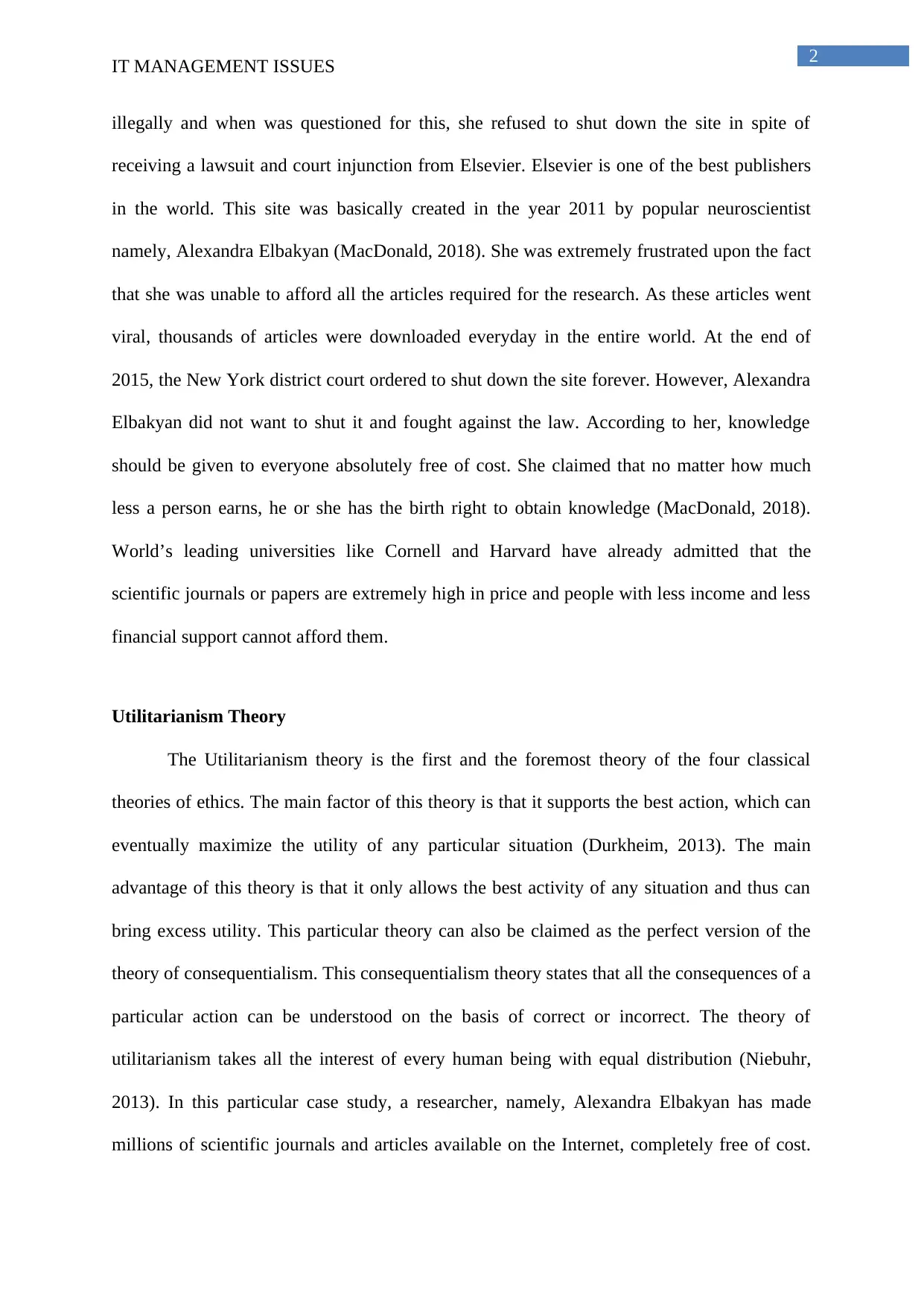
2
IT MANAGEMENT ISSUES
illegally and when was questioned for this, she refused to shut down the site in spite of
receiving a lawsuit and court injunction from Elsevier. Elsevier is one of the best publishers
in the world. This site was basically created in the year 2011 by popular neuroscientist
namely, Alexandra Elbakyan (MacDonald, 2018). She was extremely frustrated upon the fact
that she was unable to afford all the articles required for the research. As these articles went
viral, thousands of articles were downloaded everyday in the entire world. At the end of
2015, the New York district court ordered to shut down the site forever. However, Alexandra
Elbakyan did not want to shut it and fought against the law. According to her, knowledge
should be given to everyone absolutely free of cost. She claimed that no matter how much
less a person earns, he or she has the birth right to obtain knowledge (MacDonald, 2018).
World’s leading universities like Cornell and Harvard have already admitted that the
scientific journals or papers are extremely high in price and people with less income and less
financial support cannot afford them.
Utilitarianism Theory
The Utilitarianism theory is the first and the foremost theory of the four classical
theories of ethics. The main factor of this theory is that it supports the best action, which can
eventually maximize the utility of any particular situation (Durkheim, 2013). The main
advantage of this theory is that it only allows the best activity of any situation and thus can
bring excess utility. This particular theory can also be claimed as the perfect version of the
theory of consequentialism. This consequentialism theory states that all the consequences of a
particular action can be understood on the basis of correct or incorrect. The theory of
utilitarianism takes all the interest of every human being with equal distribution (Niebuhr,
2013). In this particular case study, a researcher, namely, Alexandra Elbakyan has made
millions of scientific journals and articles available on the Internet, completely free of cost.
IT MANAGEMENT ISSUES
illegally and when was questioned for this, she refused to shut down the site in spite of
receiving a lawsuit and court injunction from Elsevier. Elsevier is one of the best publishers
in the world. This site was basically created in the year 2011 by popular neuroscientist
namely, Alexandra Elbakyan (MacDonald, 2018). She was extremely frustrated upon the fact
that she was unable to afford all the articles required for the research. As these articles went
viral, thousands of articles were downloaded everyday in the entire world. At the end of
2015, the New York district court ordered to shut down the site forever. However, Alexandra
Elbakyan did not want to shut it and fought against the law. According to her, knowledge
should be given to everyone absolutely free of cost. She claimed that no matter how much
less a person earns, he or she has the birth right to obtain knowledge (MacDonald, 2018).
World’s leading universities like Cornell and Harvard have already admitted that the
scientific journals or papers are extremely high in price and people with less income and less
financial support cannot afford them.
Utilitarianism Theory
The Utilitarianism theory is the first and the foremost theory of the four classical
theories of ethics. The main factor of this theory is that it supports the best action, which can
eventually maximize the utility of any particular situation (Durkheim, 2013). The main
advantage of this theory is that it only allows the best activity of any situation and thus can
bring excess utility. This particular theory can also be claimed as the perfect version of the
theory of consequentialism. This consequentialism theory states that all the consequences of a
particular action can be understood on the basis of correct or incorrect. The theory of
utilitarianism takes all the interest of every human being with equal distribution (Niebuhr,
2013). In this particular case study, a researcher, namely, Alexandra Elbakyan has made
millions of scientific journals and articles available on the Internet, completely free of cost.
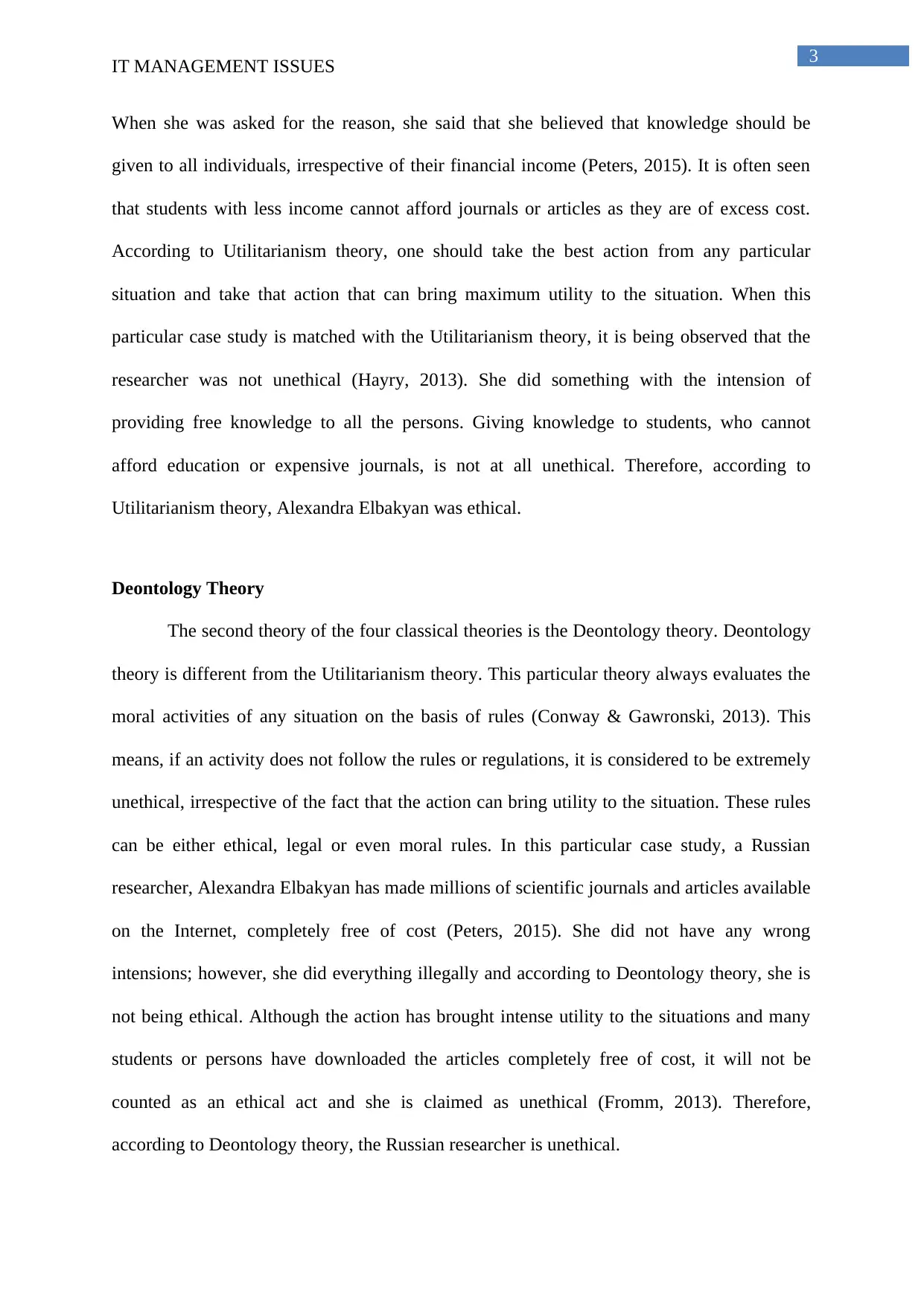
3
IT MANAGEMENT ISSUES
When she was asked for the reason, she said that she believed that knowledge should be
given to all individuals, irrespective of their financial income (Peters, 2015). It is often seen
that students with less income cannot afford journals or articles as they are of excess cost.
According to Utilitarianism theory, one should take the best action from any particular
situation and take that action that can bring maximum utility to the situation. When this
particular case study is matched with the Utilitarianism theory, it is being observed that the
researcher was not unethical (Hayry, 2013). She did something with the intension of
providing free knowledge to all the persons. Giving knowledge to students, who cannot
afford education or expensive journals, is not at all unethical. Therefore, according to
Utilitarianism theory, Alexandra Elbakyan was ethical.
Deontology Theory
The second theory of the four classical theories is the Deontology theory. Deontology
theory is different from the Utilitarianism theory. This particular theory always evaluates the
moral activities of any situation on the basis of rules (Conway & Gawronski, 2013). This
means, if an activity does not follow the rules or regulations, it is considered to be extremely
unethical, irrespective of the fact that the action can bring utility to the situation. These rules
can be either ethical, legal or even moral rules. In this particular case study, a Russian
researcher, Alexandra Elbakyan has made millions of scientific journals and articles available
on the Internet, completely free of cost (Peters, 2015). She did not have any wrong
intensions; however, she did everything illegally and according to Deontology theory, she is
not being ethical. Although the action has brought intense utility to the situations and many
students or persons have downloaded the articles completely free of cost, it will not be
counted as an ethical act and she is claimed as unethical (Fromm, 2013). Therefore,
according to Deontology theory, the Russian researcher is unethical.
IT MANAGEMENT ISSUES
When she was asked for the reason, she said that she believed that knowledge should be
given to all individuals, irrespective of their financial income (Peters, 2015). It is often seen
that students with less income cannot afford journals or articles as they are of excess cost.
According to Utilitarianism theory, one should take the best action from any particular
situation and take that action that can bring maximum utility to the situation. When this
particular case study is matched with the Utilitarianism theory, it is being observed that the
researcher was not unethical (Hayry, 2013). She did something with the intension of
providing free knowledge to all the persons. Giving knowledge to students, who cannot
afford education or expensive journals, is not at all unethical. Therefore, according to
Utilitarianism theory, Alexandra Elbakyan was ethical.
Deontology Theory
The second theory of the four classical theories is the Deontology theory. Deontology
theory is different from the Utilitarianism theory. This particular theory always evaluates the
moral activities of any situation on the basis of rules (Conway & Gawronski, 2013). This
means, if an activity does not follow the rules or regulations, it is considered to be extremely
unethical, irrespective of the fact that the action can bring utility to the situation. These rules
can be either ethical, legal or even moral rules. In this particular case study, a Russian
researcher, Alexandra Elbakyan has made millions of scientific journals and articles available
on the Internet, completely free of cost (Peters, 2015). She did not have any wrong
intensions; however, she did everything illegally and according to Deontology theory, she is
not being ethical. Although the action has brought intense utility to the situations and many
students or persons have downloaded the articles completely free of cost, it will not be
counted as an ethical act and she is claimed as unethical (Fromm, 2013). Therefore,
according to Deontology theory, the Russian researcher is unethical.
Secure Best Marks with AI Grader
Need help grading? Try our AI Grader for instant feedback on your assignments.
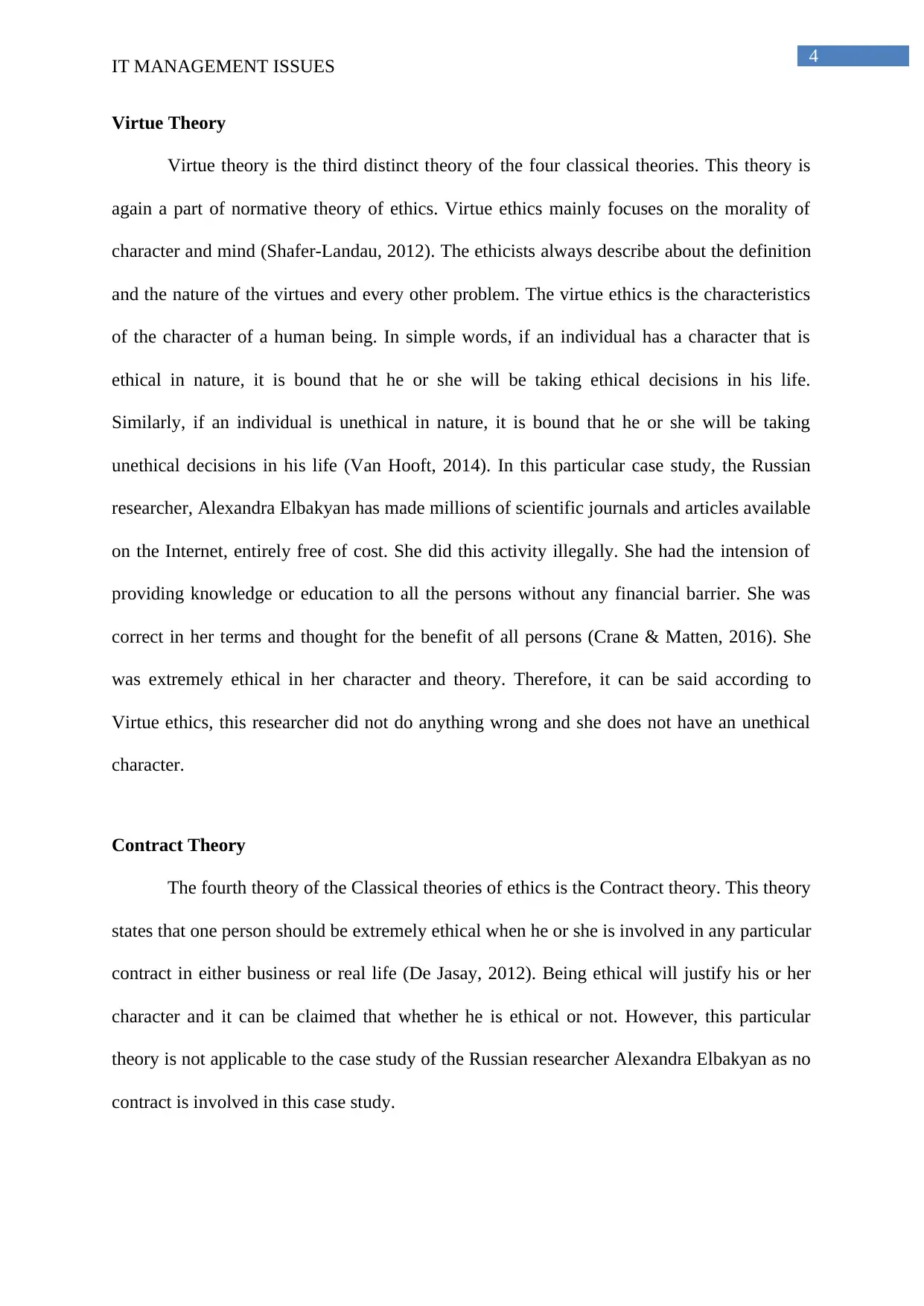
4
IT MANAGEMENT ISSUES
Virtue Theory
Virtue theory is the third distinct theory of the four classical theories. This theory is
again a part of normative theory of ethics. Virtue ethics mainly focuses on the morality of
character and mind (Shafer-Landau, 2012). The ethicists always describe about the definition
and the nature of the virtues and every other problem. The virtue ethics is the characteristics
of the character of a human being. In simple words, if an individual has a character that is
ethical in nature, it is bound that he or she will be taking ethical decisions in his life.
Similarly, if an individual is unethical in nature, it is bound that he or she will be taking
unethical decisions in his life (Van Hooft, 2014). In this particular case study, the Russian
researcher, Alexandra Elbakyan has made millions of scientific journals and articles available
on the Internet, entirely free of cost. She did this activity illegally. She had the intension of
providing knowledge or education to all the persons without any financial barrier. She was
correct in her terms and thought for the benefit of all persons (Crane & Matten, 2016). She
was extremely ethical in her character and theory. Therefore, it can be said according to
Virtue ethics, this researcher did not do anything wrong and she does not have an unethical
character.
Contract Theory
The fourth theory of the Classical theories of ethics is the Contract theory. This theory
states that one person should be extremely ethical when he or she is involved in any particular
contract in either business or real life (De Jasay, 2012). Being ethical will justify his or her
character and it can be claimed that whether he is ethical or not. However, this particular
theory is not applicable to the case study of the Russian researcher Alexandra Elbakyan as no
contract is involved in this case study.
IT MANAGEMENT ISSUES
Virtue Theory
Virtue theory is the third distinct theory of the four classical theories. This theory is
again a part of normative theory of ethics. Virtue ethics mainly focuses on the morality of
character and mind (Shafer-Landau, 2012). The ethicists always describe about the definition
and the nature of the virtues and every other problem. The virtue ethics is the characteristics
of the character of a human being. In simple words, if an individual has a character that is
ethical in nature, it is bound that he or she will be taking ethical decisions in his life.
Similarly, if an individual is unethical in nature, it is bound that he or she will be taking
unethical decisions in his life (Van Hooft, 2014). In this particular case study, the Russian
researcher, Alexandra Elbakyan has made millions of scientific journals and articles available
on the Internet, entirely free of cost. She did this activity illegally. She had the intension of
providing knowledge or education to all the persons without any financial barrier. She was
correct in her terms and thought for the benefit of all persons (Crane & Matten, 2016). She
was extremely ethical in her character and theory. Therefore, it can be said according to
Virtue ethics, this researcher did not do anything wrong and she does not have an unethical
character.
Contract Theory
The fourth theory of the Classical theories of ethics is the Contract theory. This theory
states that one person should be extremely ethical when he or she is involved in any particular
contract in either business or real life (De Jasay, 2012). Being ethical will justify his or her
character and it can be claimed that whether he is ethical or not. However, this particular
theory is not applicable to the case study of the Russian researcher Alexandra Elbakyan as no
contract is involved in this case study.
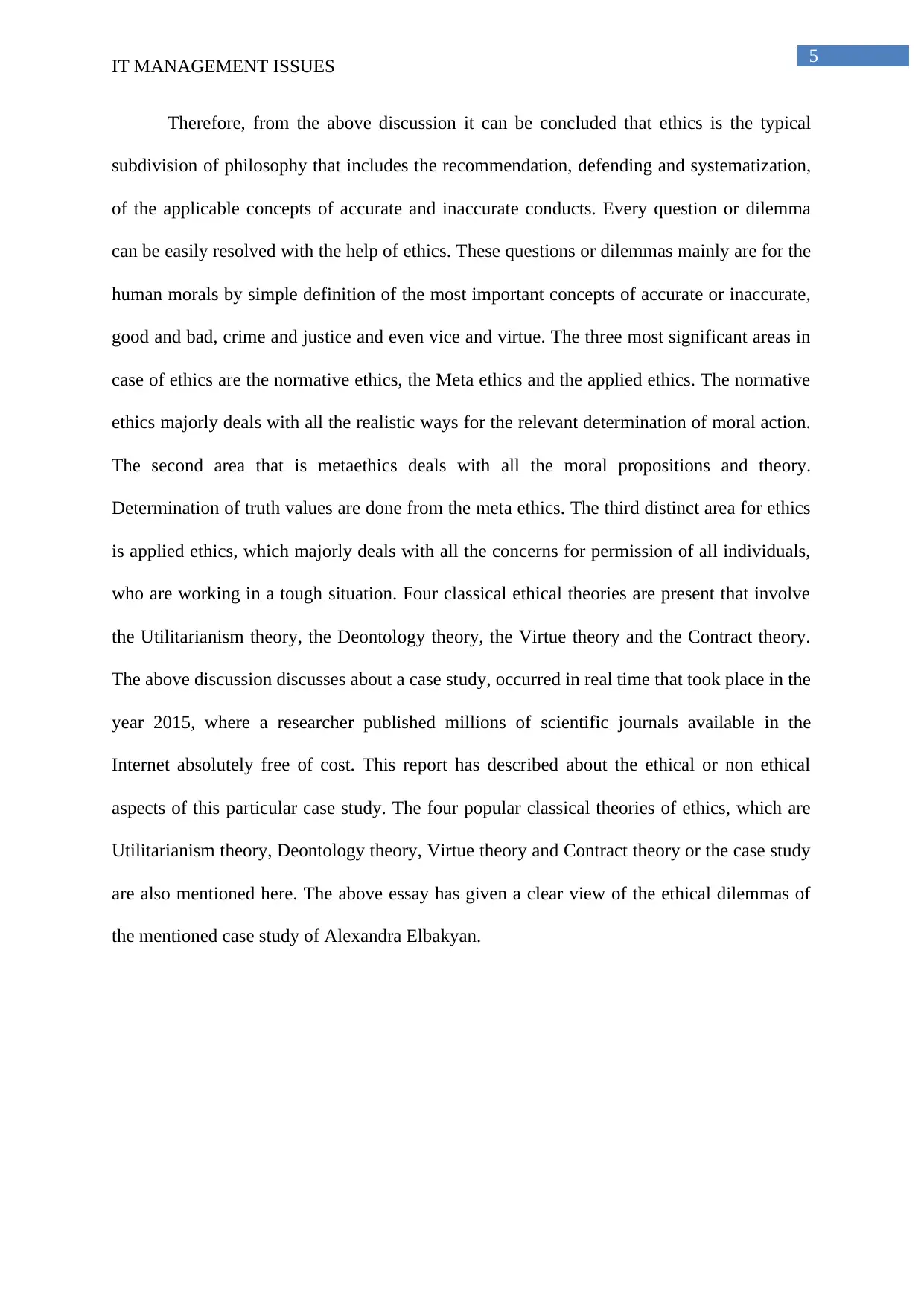
5
IT MANAGEMENT ISSUES
Therefore, from the above discussion it can be concluded that ethics is the typical
subdivision of philosophy that includes the recommendation, defending and systematization,
of the applicable concepts of accurate and inaccurate conducts. Every question or dilemma
can be easily resolved with the help of ethics. These questions or dilemmas mainly are for the
human morals by simple definition of the most important concepts of accurate or inaccurate,
good and bad, crime and justice and even vice and virtue. The three most significant areas in
case of ethics are the normative ethics, the Meta ethics and the applied ethics. The normative
ethics majorly deals with all the realistic ways for the relevant determination of moral action.
The second area that is metaethics deals with all the moral propositions and theory.
Determination of truth values are done from the meta ethics. The third distinct area for ethics
is applied ethics, which majorly deals with all the concerns for permission of all individuals,
who are working in a tough situation. Four classical ethical theories are present that involve
the Utilitarianism theory, the Deontology theory, the Virtue theory and the Contract theory.
The above discussion discusses about a case study, occurred in real time that took place in the
year 2015, where a researcher published millions of scientific journals available in the
Internet absolutely free of cost. This report has described about the ethical or non ethical
aspects of this particular case study. The four popular classical theories of ethics, which are
Utilitarianism theory, Deontology theory, Virtue theory and Contract theory or the case study
are also mentioned here. The above essay has given a clear view of the ethical dilemmas of
the mentioned case study of Alexandra Elbakyan.
IT MANAGEMENT ISSUES
Therefore, from the above discussion it can be concluded that ethics is the typical
subdivision of philosophy that includes the recommendation, defending and systematization,
of the applicable concepts of accurate and inaccurate conducts. Every question or dilemma
can be easily resolved with the help of ethics. These questions or dilemmas mainly are for the
human morals by simple definition of the most important concepts of accurate or inaccurate,
good and bad, crime and justice and even vice and virtue. The three most significant areas in
case of ethics are the normative ethics, the Meta ethics and the applied ethics. The normative
ethics majorly deals with all the realistic ways for the relevant determination of moral action.
The second area that is metaethics deals with all the moral propositions and theory.
Determination of truth values are done from the meta ethics. The third distinct area for ethics
is applied ethics, which majorly deals with all the concerns for permission of all individuals,
who are working in a tough situation. Four classical ethical theories are present that involve
the Utilitarianism theory, the Deontology theory, the Virtue theory and the Contract theory.
The above discussion discusses about a case study, occurred in real time that took place in the
year 2015, where a researcher published millions of scientific journals available in the
Internet absolutely free of cost. This report has described about the ethical or non ethical
aspects of this particular case study. The four popular classical theories of ethics, which are
Utilitarianism theory, Deontology theory, Virtue theory and Contract theory or the case study
are also mentioned here. The above essay has given a clear view of the ethical dilemmas of
the mentioned case study of Alexandra Elbakyan.
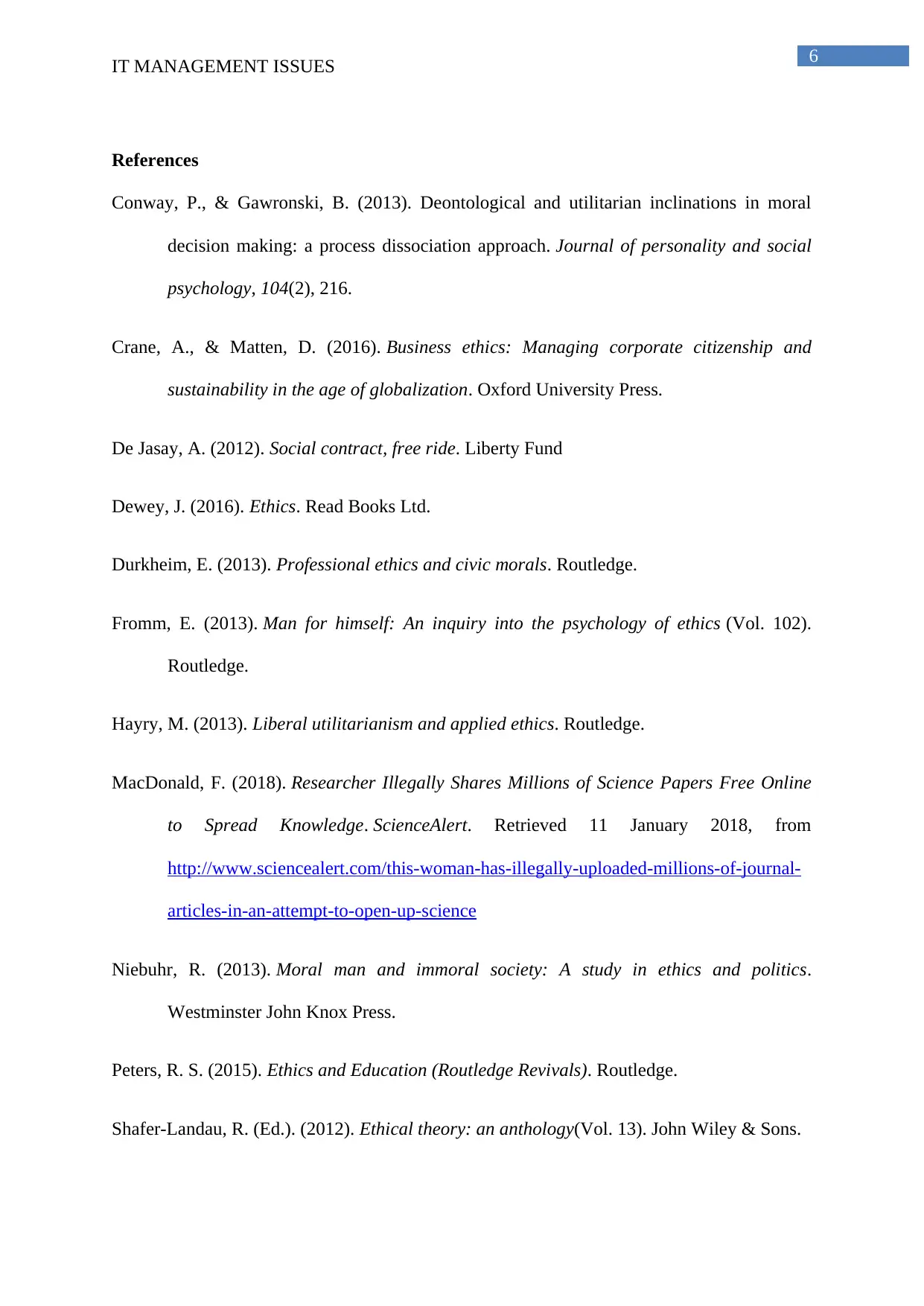
6
IT MANAGEMENT ISSUES
References
Conway, P., & Gawronski, B. (2013). Deontological and utilitarian inclinations in moral
decision making: a process dissociation approach. Journal of personality and social
psychology, 104(2), 216.
Crane, A., & Matten, D. (2016). Business ethics: Managing corporate citizenship and
sustainability in the age of globalization. Oxford University Press.
De Jasay, A. (2012). Social contract, free ride. Liberty Fund
Dewey, J. (2016). Ethics. Read Books Ltd.
Durkheim, E. (2013). Professional ethics and civic morals. Routledge.
Fromm, E. (2013). Man for himself: An inquiry into the psychology of ethics (Vol. 102).
Routledge.
Hayry, M. (2013). Liberal utilitarianism and applied ethics. Routledge.
MacDonald, F. (2018). Researcher Illegally Shares Millions of Science Papers Free Online
to Spread Knowledge. ScienceAlert. Retrieved 11 January 2018, from
http://www.sciencealert.com/this-woman-has-illegally-uploaded-millions-of-journal-
articles-in-an-attempt-to-open-up-science
Niebuhr, R. (2013). Moral man and immoral society: A study in ethics and politics.
Westminster John Knox Press.
Peters, R. S. (2015). Ethics and Education (Routledge Revivals). Routledge.
Shafer-Landau, R. (Ed.). (2012). Ethical theory: an anthology(Vol. 13). John Wiley & Sons.
IT MANAGEMENT ISSUES
References
Conway, P., & Gawronski, B. (2013). Deontological and utilitarian inclinations in moral
decision making: a process dissociation approach. Journal of personality and social
psychology, 104(2), 216.
Crane, A., & Matten, D. (2016). Business ethics: Managing corporate citizenship and
sustainability in the age of globalization. Oxford University Press.
De Jasay, A. (2012). Social contract, free ride. Liberty Fund
Dewey, J. (2016). Ethics. Read Books Ltd.
Durkheim, E. (2013). Professional ethics and civic morals. Routledge.
Fromm, E. (2013). Man for himself: An inquiry into the psychology of ethics (Vol. 102).
Routledge.
Hayry, M. (2013). Liberal utilitarianism and applied ethics. Routledge.
MacDonald, F. (2018). Researcher Illegally Shares Millions of Science Papers Free Online
to Spread Knowledge. ScienceAlert. Retrieved 11 January 2018, from
http://www.sciencealert.com/this-woman-has-illegally-uploaded-millions-of-journal-
articles-in-an-attempt-to-open-up-science
Niebuhr, R. (2013). Moral man and immoral society: A study in ethics and politics.
Westminster John Knox Press.
Peters, R. S. (2015). Ethics and Education (Routledge Revivals). Routledge.
Shafer-Landau, R. (Ed.). (2012). Ethical theory: an anthology(Vol. 13). John Wiley & Sons.
Paraphrase This Document
Need a fresh take? Get an instant paraphrase of this document with our AI Paraphraser
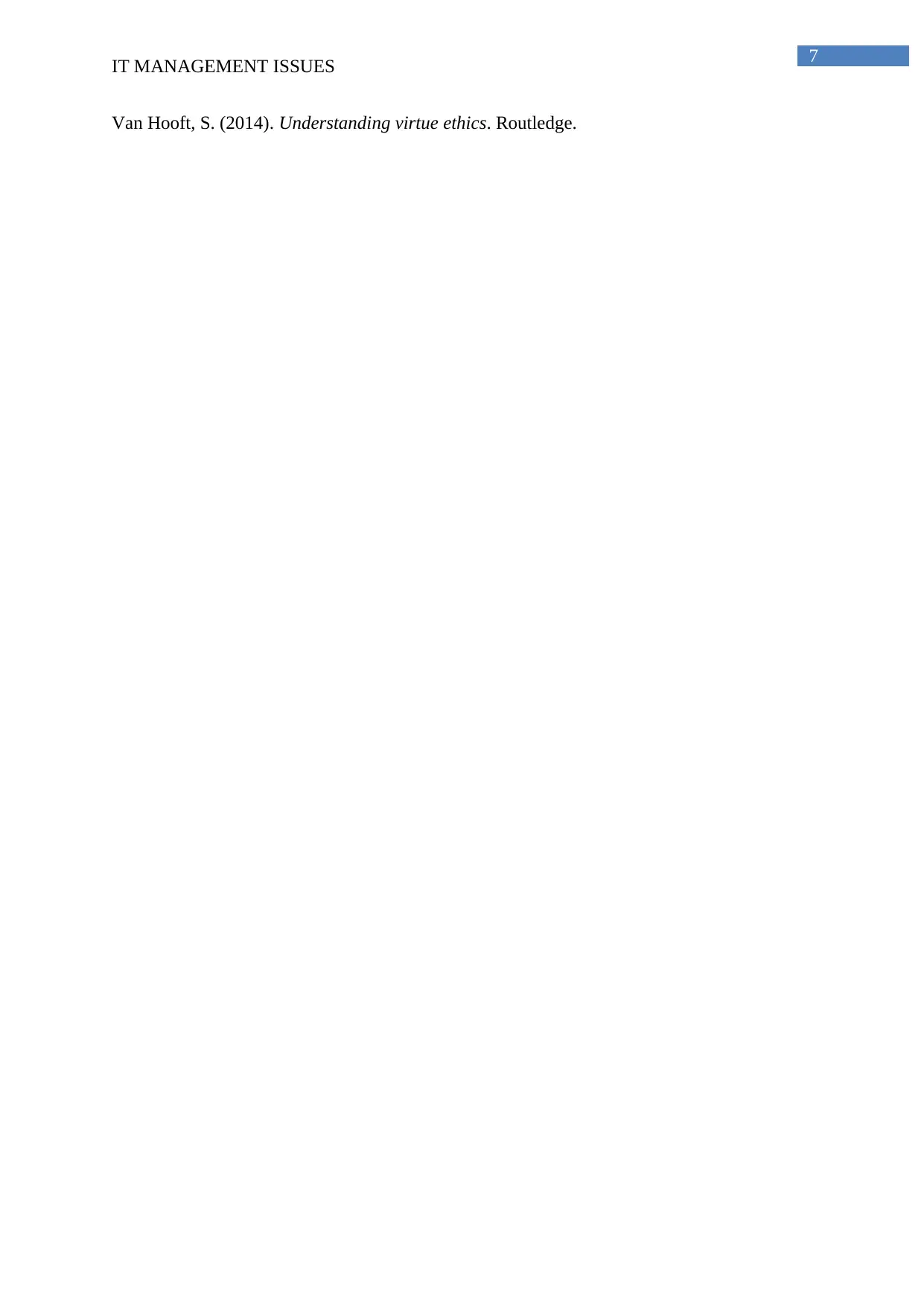
7
IT MANAGEMENT ISSUES
Van Hooft, S. (2014). Understanding virtue ethics. Routledge.
IT MANAGEMENT ISSUES
Van Hooft, S. (2014). Understanding virtue ethics. Routledge.
1 out of 8
Related Documents
Your All-in-One AI-Powered Toolkit for Academic Success.
+13062052269
info@desklib.com
Available 24*7 on WhatsApp / Email
![[object Object]](/_next/static/media/star-bottom.7253800d.svg)
Unlock your academic potential
© 2024 | Zucol Services PVT LTD | All rights reserved.
